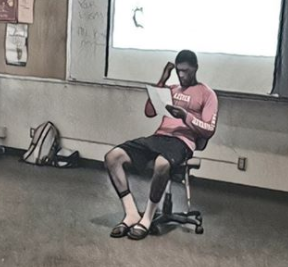I finally attempted the “author’s chair” activity, something I had experienced at San Diego Area Writing Project. This protocol calls for students to take a seat in the front of the room to read a piece of their writing, typically a work in progress. I never had the nerve to try before. What if no one volunteered? What if students didn’t respond? What if students weren't interested in each others' ideas?
On this particular day, students had completed a mini-essay, a flash draft. I set up the room, explaining the process. I reminded folks about one of our “class agreements”: No apologies! What we write in class are first drafts, sloppy and scribbly, so there’s no need to say “I’m sorry". I want students to be be okay with the natural imperfections of an early draft. I want them to develop the nerve they need to share works in progress.
Thursday, September 28, 2017
Monday, September 25, 2017
Previewing & Pre-Writing: First Year Students Dive into Freire
 I’m rediscovering how important it is to provide students with multiple “ways into a topic” when approaching a new text. I admit that I used to simply assign a reading and then be upset with myself and students for not understanding the text.
I’m rediscovering how important it is to provide students with multiple “ways into a topic” when approaching a new text. I admit that I used to simply assign a reading and then be upset with myself and students for not understanding the text.
Starting last year, I took intentional steps to to solve the problem of preparing students to read. My particular challenge this semester? To access prior knowledge and to provide background knowledge before plonking them into chapter two of Paulo Freire’s Pedagogy of the Oppressed.
Wednesday, September 20, 2017
Feeling the Burn of Mentor Texts & Mea Culpas
Teachers should learn from students. This statement has become so axiomatic as to become cliche. Tired, even. And yet, it’s a home truth, one that I subscribe to because of my study of Paulo Freire and bell hooks On an intellectual, theoretical tip, I get it. Teacher-student. Student-teacher. Resolve the contradiction between those roles.
A recent pair of episodes, however, hit me at an experiential, gut level. What happened in class taught me, in a new way, essential lessons. Students modeled how I can “practice what I preach in terms of the kind of person I want to be and the kind of writer I aspire to become.
Saturday, September 16, 2017
Debriefing DACA in the Writing Class
When given a chance, students testify to their desire for meaningful lessons. As one student wrote in an exit ticket, “Teachers can help us learn . . . about real life.” In an online discussion, students agreed they want to know how to deal with issues they encounter in their lives. They want relevant lessons that apply to their lived realities. That and the fact that our campus is located in Chula Vista, a stone's throw from the border, compelled me to discuss the repeal of the Deferred Action for Childhood Arrival (DACA). As a college professor, I have a duty to address an issue that affects so many in our community. I am also obligated to show students how a critical thinkers might approach these kind of issues.
Subscribe to:
Posts (Atom)


